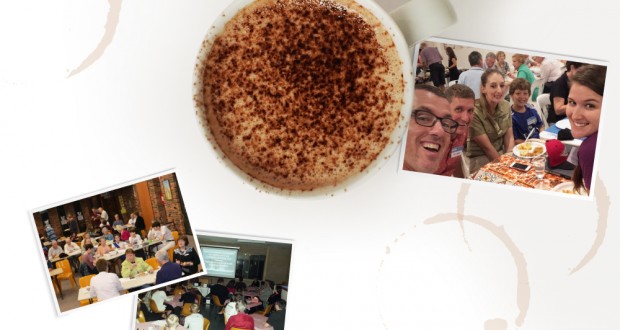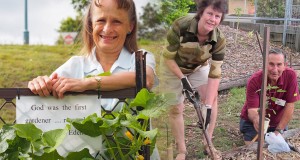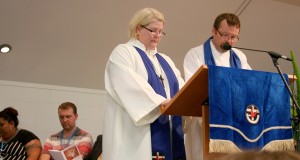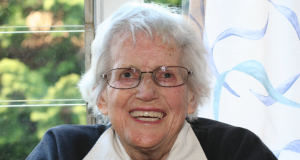Whenever two or three people gather to eat and drink together as part of worship, café church is happening. Dianne Jensen talks to three Queensland congregations exploring fresh forms of this ancient model of being church.
It’s family friendly, low key, and a lot harder to slip into the back row unnoticed. Café church is a contemporary reimagining of a concept which harks back to the early church; the coming together of small Christian communities to break bread and share worship.
Many Uniting Churches across Queensland have caught the vision, but how does the model really work, and is it right for your church community?
In general terms, most café churches are lay-led, collaborative services in informal worship spaces with ad hoc café-style seating. Whether hot fork suppers or fast food, there is always something to eat and drink, and the format is likely to include creative forms of liturgy and shared prayer and discussion around tables.
Creating family spaces
The evening café church in St Stephen’s Uniting Church hall in Maryborough is still going strong after 15 years.
“It began when a small group of people got together to experience a different form of worship in a less formal manner,” says veteran organiser Nalda Brett.
“Café church has been the entry level for many folk who were not regular worshippers and who feel uncomfortable in a traditional church set-up. People love the informal style and the chance to be part of family-style worship.”
The monthly services are planned around a theme, and the congregation of between 30 and 90 people often includes regulars from country churches. Everyone brings a plate, and dinner is shared during a short break in the 90-minute service.
Music is especially important, attracting participation from other local churches.
“Our regular keyboard player is the organist at the Anglican church and her husband plays clarinet in the band. Another clarinet player is a minister at the New Apostolic Church, and his wife plays flute with him. One of our violin players is from the Church of Christ, her son plays guitar in the group and her husband is our sound man. Another teenager plays accordion and joins us from Hervey Bay. The other band members are from St Stephen’s, a violinist who is 81 years young, and three singers who lead the worship,” says Nalda.
“It is a great way to get to know each other, to experience different styles of worship, and to use our God-given talents in music, singing, prayer, drama and participation. Working as a team helps folk grow spiritually and learn how to lead worship. Food and fellowship bring together a meaningful outreach event. It is well worth all the effort.”
Worship without barriers
Café church at Oxley Darra Uniting Church in Brisbane’s west is a monthly service organised by different groups on a roster. Food and drink are provided by the church.
“We still follow what I would call a normal church liturgy; it just becomes a little less formal in those spaces,” says Rev Andrew Gunton.
“It’s more about trying to take away some of those barriers that the pews can put up, with people feeling a bit more relaxed gathering around a table and sharing food together as part of the service. We often do things in table groups, having a chat about an idea or using the group for prayer.”
The café church format gives people the freedom to contribute their own creativity and life experience to worship, he adds.
“We don’t lose the elements that make a worship service—they are simply presented in a different format. For those people who are regular churchgoers, I think they appreciate the difference and it can move them to engage in a different way.”
The service draws about 40 to 50 regular attenders representing a cross section of ages.
“I think we get people who are more on the fringes coming to café church but we do occasionally get some people who have been invited by friends,” says Andrew. “And it doesn’t matter how much promotion we do in the church, the personal invitation is going to be the one which gets results.
“People need to recognise that café church is not going to be the silver bullet that solves every dilemma in the life of the church; it’s simply another way that we can present a worship service.”
Building new community
Pastor Phil Smith describes the Sunday worship at BELLS, a new faith community in Bells Reach on the Sunshine Coast, as dinner church. The thriving congregation of 40 to 45 people is about to relocate to Unity College, where Phil is campus minister, after outgrowing space at the real estate developer’s offices.
“The tables are set up and everybody brings food to share,” says Phil. “Eating just sort of flows out of the message discussion time. So liturgical structure—you would have to look a bit more closely to recognise it—but that happens around the tables and then flows into the meal, particularly if we are celebrating holy communion that leads us into grace.”
Like the average family meal, there’s always plenty of noise and busyness at dinner church, he adds. And as the faith community grows, the limitations of the café church model are clear.
“When you want things to be relaxed and welcoming and open, people need to actually know one another. Café church has that sense of intimacy and there’s a limit to how big it can be … so do we move to the next model, or do we do the same thing at another place at another time?
“For instance, in the summer we want to explore a pop-up church in the community garden so we bring the barbeque down there, eat the produce from the garden, and have a very accessible public form of worship.”
Phil suggests that models such as café/dinner church are challenging the accepted wisdom that Sunday worship is the central experience of Christian life.
“This needs to be missional community and I think the café church idea lends itself to that, whereas one of the risks with a more traditional form of church is that sense of, well I can drive 40 minutes and go there on Sunday for an hour and then go away and never really have to get to know those people at all,” says Phil.
“For me as the pastor, this church is for people who are either disconnected from church or have not experienced the life of church before—that they would sense that they belong and that this grows beyond Sunday night.”
Café church tips:
- Remember that café church is a worship service.
- What is it that people actually want and need?
- Consider sustainability. What are your resources and how can you create opportunities for leadership?
- Plan each service around a theme. Be creative.
- Watch the clock. Keep speakers to a time slot and be prepared to skip songs to finish on schedule.
- Don’t skimp on hospitality.
- Be willing and able to welcome newcomers.
- Be realistic with expectations.
- Have fun!
 JourneyOnline
JourneyOnline







